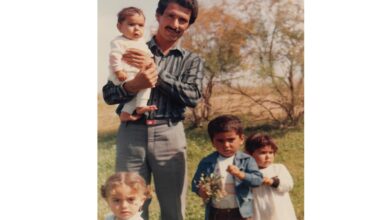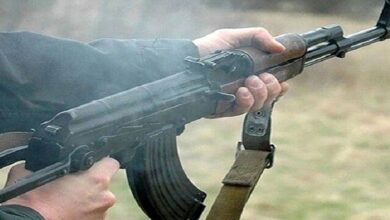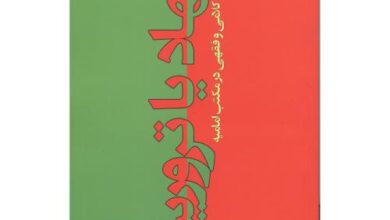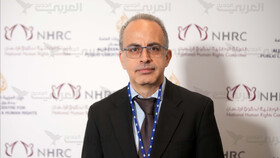The Victims of Terrorism Defense Association Panel Discussed : The Impact of Terrorism on Human Rights in Iran
According to the Victims of Terrorism Defense Association, the association held a panel titled Human Rights in Iran on the sidelines of the 58th session of the UN Human Rights Council in Geneva, Switzerland. In this panel, which was held on Thursday, March 20, 2024, the issue of the impact of terrorist groups’ actions on human rights in Iran was examined by international law professors from Iran, the United States, and several families of terror victims.

In his speech titled “Terrorism and the Right to Self-Determination in Iran,” Dr. Heibatollah Nejndimanesh, a professor of international law, emphasized that the right to self-determination is one of the fundamental principles of international law that the Iranian people have benefited from through democratic mechanisms. Referring to the 1979 referendum and the continuous elections in Iran, he said that the country’s sovereignty is based on the will of the people.
Nejndimanesh went on to describe terrorist groups such as the People’s Mojahedin Organization, Kurdish separatist groups, and terrorist groups active in southeastern Iran as a threat to the right to self-determination, stressing that these groups, which are supported by foreign powers, aim to destabilize the country and create division.
He called on the international community to stop supporting these groups, pressure countries that shelter terrorists, and recognize the rights of victims of terrorism. He also emphasized the role of the Association for the Defense of Victims of Terrorism in pursuing justice and raising awareness at the international level, and stated that combating terrorism is a fundamental human rights issue.
He also stressed that the former and current rapporteurs are not impartial and act biased. According to him, the Association for the Defense of Victims of Terrorism sent the rapporteur ten emails, but he did not respond, despite the fact that he attended meetings of opposition groups to the Islamic Republic of Iran as a speaker. In addition, he is a faculty member at Monash University, Australia, who participated in the preparation of false reports by the Boroumand Foundation.
Dr. Mansoureh Karami, the wife of the martyred nuclear scientist Ali Mohammadi, also explained the effects of the assassination of Iranian scientists on scientific progress, while telling a story about Dr. Ali Mohammadi’s testimony and stating that the systematic assassination of Iranian scientists, especially by the Mossad and the terrorist group of the MKO (Mirafiqun) is a clear violation of Iran’s right to development. These assassinations, which have continued since 2010, are an attempt to undermine the country’s scientific and technological progress.
She added that these assassinations violate the UN Charter, the International Covenant on Civil and Political Rights, and the fundamental principles of the right to development. In addition, economic sanctions and cyberattacks, such as Stuxnet, are part of a combined war against Iran’s scientific progress. Therefore, the international community must condemn these assassinations and hold the perpetrators accountable. Also, the cruel scientific sanctions against Iran must end. Iran’s progress, despite all the pressures, shows that terror and sanctions cannot stop the path of development. The right to development is non-negotiable and the world must stand against scientific colonialism.
Mr. Hossein Soltaninejad, who lost 8 members of his family in the terrorist attack in the Kerman Martyrs’ Cemetery, also narrated the story of this terrorist crime and stated, Today, I stand before you as a father, husband, brother and uncle who is mourning his loved ones. I speak on behalf of the families of the eight martyrs who lost their lives in the brutal terrorist attack in the Kerman Martyrs’ Cemetery. My son, Amir Ali, was an eyewitness to this incident. He suffered severe injuries and underwent six major surgeries on his head, legs and abdomen. He also witnessed the murder of his mother, sister and all our close relatives. These painful events have left a deep impact on him, both spiritually and socially, wounds that will not heal anytime soon.
Among the victims were my daughter Maryam, my wife Naghmeh Golzari, my sisters Somayeh and Fatemeh, and my young nephews and nieces Mehdi, Mohammad Amin, Fatemeh Zahra, and Reyhaneh Soltaninejad. The same little girl with the pink jacket and heart earrings, whose innocent smile is now a painful memory.
We are not here to seek revenge. We want the truth. We want justice. Our families have the right to know who is responsible for this crime? Why did this tragedy happen? What steps are being taken to hold the perpetrators accountable? Justice does not just mean punishing the perpetrators, it means preventing future tragedies.
Victims of terrorism should not just become numbers in reports. They were real people, with hopes, dreams, and families who loved them. Their lives were valuable. Their deaths demand accountability.
Professor Joseph Ronka, a professor at Springfield University in the United States, stated that terrorism is condemned by any group or government because human dignity and the right to life are essential to the human rights discourse. The American professor continued that the United Nations criticizes the human rights situation in Iran in its reports, but it seems unfair. All governments have their own problems. My country, the United States, has allocated approximately 55 percent of the world’s military budget. As former US President Eisenhower said, “Every bomb that is made is paid for by the poor.” Yes, peace is a human right and we should talk to each other based on the spirit of humanity and not arrogance.
Mr. Curtis Dobler, a lawyer and international lawyer, continued the meeting by saying that terrorism is a major threat to global peace and security. However, the ambiguity that exists is that there is no universally accepted definition of terrorism, which leads to instability in legal approaches. He continued, “Terrorism requires a multilateral approach that defends international and human rights.”
The next speaker on the panel was Dr. Maryam Akhavan from the Iranian Thalassemia Association, who discussed the impact of the drug embargo on thalassemia patients as a form of terrorism. She stated that the unilateral and illegal sanctions of the United States, which intensified on May 8, 2018, along with the country’s withdrawal from the JCPOA, significantly increased the mortality rate of thalassemia patients in Iran. As a result of the inhumane sanctions, the mortality rate of Iranian thalassemia patients has increased four times compared to the period before the US withdrew from the JCPOA, and this tragedy has been exacerbated not only by unilateral sanctions but also by compliance or over-compliance with them.
It is worth noting that representatives of the governments of Germany, Switzerland, and Belgium, as well as representatives of human rights organizations, were present on the panel. The UN Human Rights Council meeting will be held from March 26, 2020 to April 15, 2021 in Geneva, Switzerland.





